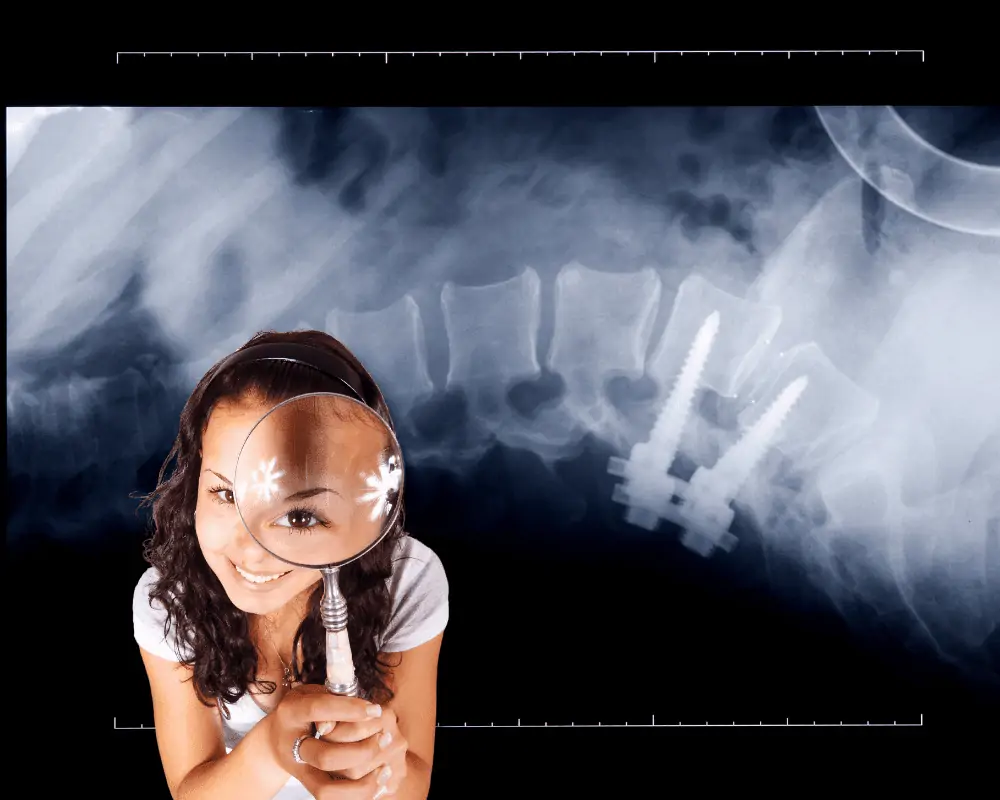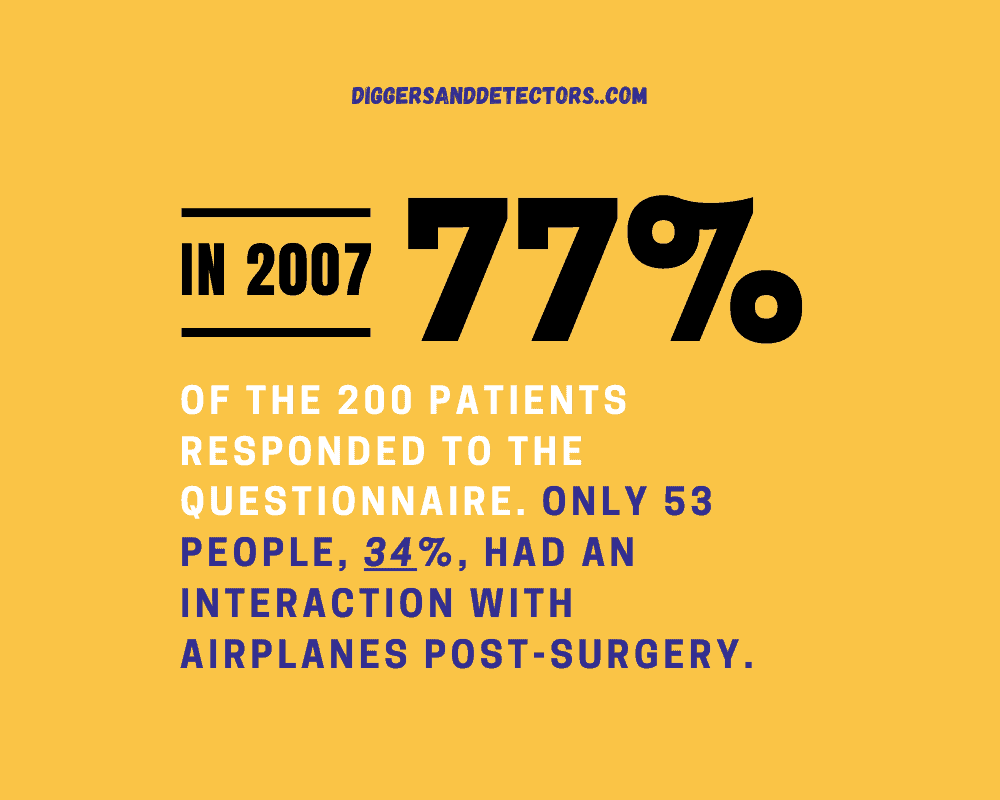I won’t lie to you.
Giving you a simple yes or no answer to your question isn’t so, well, simple. There are a lot of factors to consider. What type of metal detector are we talking about? How many surgical screws do you have in your body? What are they made of? Do you have other metal implants to be accounted for?
These questions are important because each one tips the scale a little further.
You’ll hear me say this an annoying number of times, but it’s so true. Every person is different. But to give you what you came for, I’ll generalize a bit and say this:
Surgical screws will not set off metal detectors by themselves the majority of the time. As for surgical plates, well, that’s a different story.
If you want hard facts and stats to decide for yourself, skip to the section below. But I recommend reading through to get a better understanding of your own situation.
What Are Surgical Plates and Screws Made Of?

Most orthopedic surgeons use surgical plates and screws of titanium or surgical stainless steel because of their biocompatibility and resistance to corrosion.
Their detectability is usually an added bonus.
You see, all metal detectors operate with the intent of picking up the electrical conductivity that metals possess. Not every metal is a good electrical conductor, which is why metal detectors fail to catch everything.
Titanium and surgical steel are two examples of lower-conductive metals. However, this can change depending on their purity. For instance, sometimes other metals are combined to make the surgical hardware more useful for its intended purpose. Providing the implant with some flexibility while maintaining its toughness is an attribute most surgeons want.
And if the alloyed metals are highly conductive… Well, you get the idea.
Is Surgical Steel the Same as Stainless Steel?

To avoid confusion, surgical and stainless steel are the same for this discussion on plates and screws.
But outside the purposes of this article, you should know that not all stainless steel is fit for medical-grade implants.
However, that’s a conversation for another time!
Is Titanium Better than Stainless Steel?
While titanium and stainless steel are excellent surgical hardware materials, studies have shown titanium to be the better option.
A 2021 medical review examined 37 unique studies comparing real-life data of titanium vs. stainless steel implants ranging from plates, nails, and locking screws.
Focusing on strength, flexibility, brittleness, and biocompatibility, the review results showed stainless steel implants equaling or exceeding titanium’s surgical properties.

However, titanium was the clear winner because stainless steel implants showed increased damage or complete failure rates.
Yikes!
Will Surgical Screws Set Off Metal Detectors?
So here we are. You should now have a good guess as to what type of metal is in your body if you don’t know already. Whether it’s pure titanium, surgical stainless steel, or some form of titanium alloy, the likelihood of detection will be about the same.
Because of the vastly available charts and tables on electrical conductivity, many sources are quick to say that surgical screws won’t set off metal detectors. While that is technically a factual statement, let me phrase it another way.
Surgical screws by themselves, in low volumes, will not set off a walk-through metal detector (WTMD).
They’re just too small to meet the alarm threshold of almost every WTMD.

But I’ll also add that handheld wands increase the chances of detection because of the proximity of the electromagnetic field. And as for surgical plates, it’s common to set off metal detectors if you have a surgical plate implanted in your body because of their significant size increase.
Again, I say all this with the caveat that everyone is different. Your body’s total amount of conductive metals isn’t the same as most others. And more importantly, not all metal detectors are calibrated equally.
But as promised, I dug around and found three relevant studies to give you plenty of stats on detecting surgical screws and plates. There’s power in numbers, and after I lay out the information below, we can talk about what these numbers mean for you.
2005 Atrium Medical Centre Study, Netherlands
This review of orthopedic implants and airport metal detectors analyzed ten years of data from volunteers who tested the boundaries of metal detection on various metallic implants.

It’s a pretty interesting read with many comparisons of successful detection using arch detectors (WTMD) and handheld wands. If you have time, give it a look. But the most eye-popping stat was that implants were detected by handheld metal detectors 100% of the time vs. 56% using arch detectors (WTMD).
This data was collected from separate studies using various detector manufacturers across many airports.
The fascinating part was the change in successful detection using a WTMD often related to where the implant was located and how fast the volunteer walked through the machine.
But in all cases, no matter how the metal was presented, handheld wands alarms were triggered every single time.
2020 Medical Association of Thailand Article
The previous study showed just how effective handheld detectors could be. And while it was gathered from ten years of data, let’s see how another comprehensive review faired.

A group of 261 patients with a total of 386 combined implants were scanned with the Garrett Super Scanner handheld metal detector, which imitated the same screening sensitivity travelers would experience from the Suvarnabhumi Airport TSA.
Regarding surgical screws and plates, the following stats stood out the most.
- 86.78% of all implants were detected
- 92.54% of all in the lower extremities
- 55.73% of all in the upper extremities
- 93.33% of all in the spine
- Surgical plates were detected at a rate of 98.05%
- 60% of total implants were trauma hardware (plates, screws, etc.)
The article concluded that plates were nearly always detected by handheld wands, but surgical screws were able to avoid triggering the alarm most of the time. Lastly, those testing the volunteers determined that titanium implants were more viable to be detected than stainless steel.
2007 Questionnaire Study by The Royal College of Surgeons of England
This last stat submission I collected for you is data gathered from 200 implant patients who answered a questionnaire about their airport security experience post-surgery.
What’s important about these stats is that they originate from actual events and not controlled experiments. Let’s get to it!

- 47% of the 53 patients (25 people) set off the metal detector due to implants
- Only 28% of the 47% detected reported any inconvenience
- Only 9% of the 53 people who had flown were asked for a medical ID card or similar document
Of the 53 patients who traveled by plane, 13 were categorized in the Plates and Screws (P&S) implant category. 5 of the 13 patients set off airport metal detectors, a detection rate of 39%.
That’s a lot of real-life data!
My Thoughts on the Stats
No one can predict the future. But if there’s one thing these stats show us, surgical screws won’t normally set off metal detectors. But I can’t say that 100% of the time, as you saw in this previous study.
It does happen! Just far less frequently than surgical plates and other implants.
I’ll go back to what I said before. There are too many factors to confidently give you a simple yes or no answer about your implants setting off a metal detector.

I’ve done plenty of research for similar articles related to airport metal detectors. People wonder about body jewelry, decorative pins, and dental implants. Do you know how often travelers ask why their groin sets off a TSA alarm? A lot. Like, a lot, a lot.
Anyway, my advice to you is not to worry! If you set off an alarm, you won’t be the first or the last. That’s why, before you go, take a minute to read over the following sections. It’ll give you more insight into what to expect from a different perspective.
FAQs About Surgical Hardware and Metal Detectors
There’s still plenty to talk about. Let’s see what I’ve got for you.
Are Metal Detectors Safe for Surgical Screws?
Metal detectors use non-threatening radiation levels, making them perfectly safe for surgically embedded screws and other biocompatible implants.
I cover the technical details more here, but in essence, the type of radiation airport scanners use on people is non-ionizing, the same as on your cell phone or kitchen microwave.

What Happens if My Hardware Sets Off a Metal Detector?
If your surgical plates or screws set off a metal detector, expect a physical pat-down and search by handheld metal detectors.
Going back to the 200 patient questionnaires, all 25 travelers who set off the walk-through metal detectors experienced further screening by handheld wands and a physical search.
Afterward, eighteen travelers were allowed to pass after a simple explanation. Four had to present medical documentation and show their incision line. Two were asked to show their scar, and the final traveler only needed to submit their medical letter.





